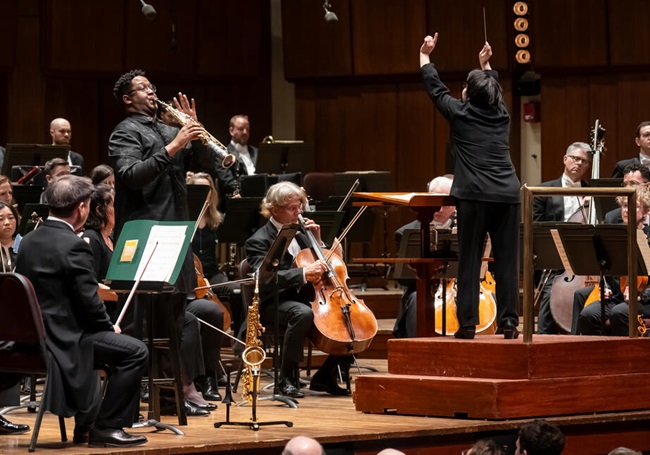Zhang brings sense of mission and discipline to wide-ranging NSO program

Saxophonist Steven Banks played with the National Symphony Orchestra and conductor Xian Zhang Thursday night. Photo: Scott Suchman
Since the National Symphony Orchestra debut of Xian Zhang, in 2010, the Chinese-born conductor has been appointed music director of the New Jersey Symphony Orchestra. With that ensemble she has made a point of raising the profile of music by women and composers of color. For her latest NSO podium appearance Thursday night in the Kennedy Center Concert Hall, she did the same, leading lesser-known works by Samuel Coleridge-Taylor and Billy Childs, alongside a more popular piece by Antonín Dvořák.
Coleridge-Taylor wrote his Ballade for Orchestra in 1898, when his mentor, Edward Elgar, passed a commission for an orchestral work from the Three Choirs Festival on to him. Zhang immediately asserted control of the piece with her cleanly articulated beat, giving the opening A minor section the defined lightness of a Mendelssohn scherzo. In the contrasting B section, set in C major, she drew out a velvety string sound on the sweet melody reminiscent of a pas de deux in a Tchaikovsky ballet.
Zhang micromanaged many details like rubato, speeding up and slowing down with emphatic efficiency, often banging her head forward for loud downbeats. Her virtue as a conductor is that her ideas about tempo, balance, and attack are all well thought out and easy to read, and the NSO musicians followed her faithfully. After a second statement of the soft B section, Zhang went for maximum energy to close out this effective concert opener.
The NSO was one of a large consortium of commissioners behind a new Saxophone Concerto from the jazz pianist and composer Billy Childs, called Diaspora. The three movements, inspired by three poems by black poets, trace the capture of people in Africa, through the harrowing middle passage into bondage in America, and their heroic resolution to survive and flourish in spite of all that was done to them.
Saxophonist Steven Banks, winner of the Young Concert Artists Competition and of an Avery Fisher Career Grant in 2022, made a pleasing ensemble debut as soloist in this work, for whom it was created. He opened the first movement, based on Nayyirah Waheed’s poem “Africa’s Lament,” with a buoyant tone on the soprano sax, accompanied by multimetric accompaniment from Zhang and the orchestra, with the sound of the marimba predominating. A movement-concluding cadenza reiterated many of the movement’s ideas, at too great a length.
Childs’ melodic imagination impressed by its abundance, as did the clarity and skill with which he combined and recombined many of the work’s themes. At the same time, the work relied heavily on some overused cliches. Menacing orchestral stabs of sound and heavy percussion evoked the suffering inflicted in the second movement, recalling the heroic resolve of Claude McKay’s poem “If We Must Die.” Banks switched effortlessly to alto sax, affording a more mellow tone.
Predictably, the piece ended with a tribute to the power of Gospel music, as Banks took his alto sax toward the back of the orchestra, for a section played with NSO pianist Lambert Orkis. In a sign of reconciliation, the tune is taken up the English horn, leaving the orchestra to gather around Banks with comforting sounds, taking its cue from Maya Angelou’s celebrated poem “Still I Rise.” Childs’ harmony at times in this section called to mind some strains of the Guy Wood song “My One and Only Love.”
Returning front and center for the big finish, Banks switched back to his soprano sax to dispatch some very high notes with admirable consistency. He then showcased his remarkable breath support some more with a glacially paced encore, The Lord’s Prayer by film composer Albert Hay Malotte. Banks played just the melody without the accompaniment, adding in a few embellishments and other personal touches, as well as more extremely high notes.
It was not such a stretch to end the program with Dvořák’s Ninth Symphony (“From the New World”), inspired as it was by Native American stories and African-American folk music during the composer’s American residency. Zhang used her careful gestures to manage ensemble balances expertly, helping the musicians time their loud tutti strikes and also never cover the first movement’s gentle flute solos. Nothing really stood out about her interpretation, which was solidly coordinated but underwhelming.
That is, until the second movement, when Zhang took her time bringing out all of Dvořák’s sometimes wondrous tone colors. A poignant English horn solo from Kathryn Meany Wilson led to plush softness from the large string section of about sixty players. In particular, the closing bars of this movement, with the strings reduced to four players, then two, and then single soloists, shimmered delicately, down to the final chord by divisi string basses.
The third movement, thanks to Zhang’s confident gestures, has rarely sounded so rhythmically unified across the metric shifts, and the middle section abounded in folksy grace. Zhang, not afraid to give the brass section the chance to blare a bit, called for and got some heraldic sounds from them to close out the Finale, first with thunderous volume and then a solemn dirge.
The program will be repeated 11:30 a.m. Friday and 8 p.m. Saturday. kennedy-center.org
